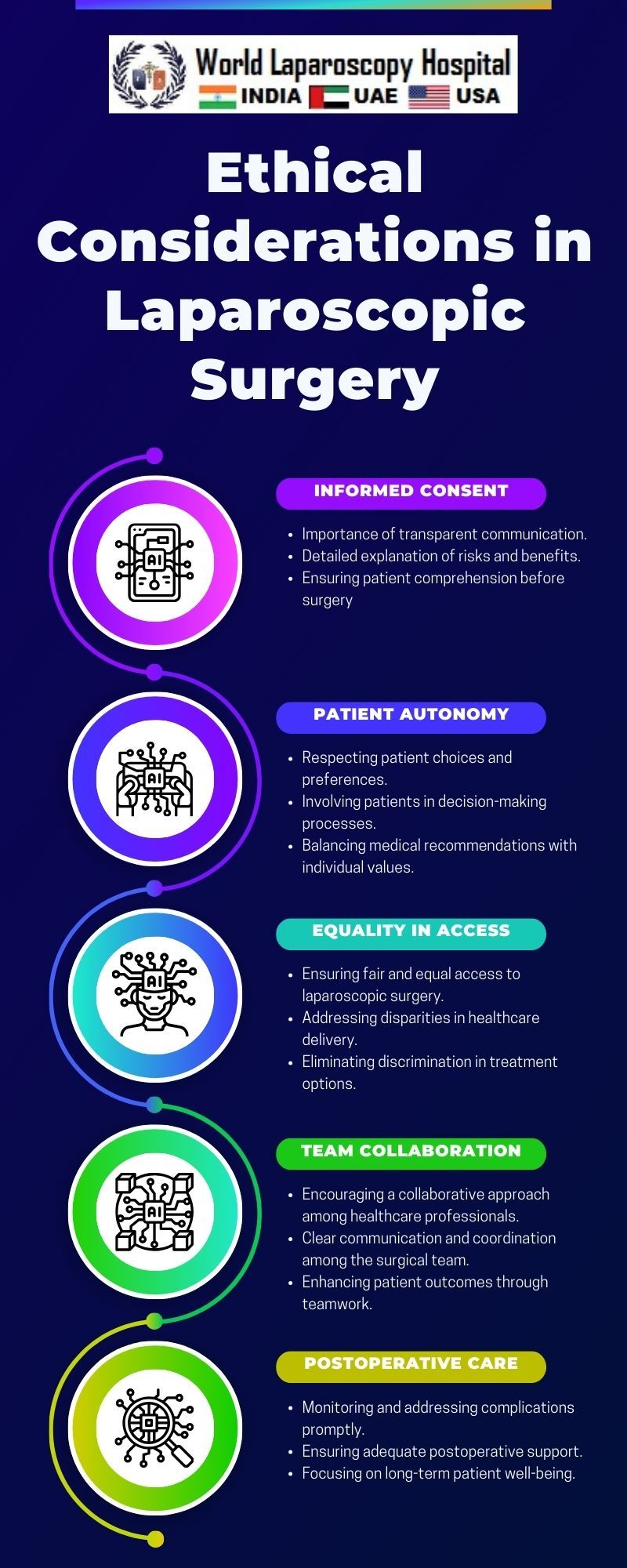Ethical Considerations in Laparoscopic Surgery
Introduction
Laparoscopic surgery, also known as minimally invasive surgery, has revolutionized the field of surgical interventions by offering patients shorter recovery times, reduced pain, and smaller incisions. While technological advancements continue to enhance its effectiveness, ethical considerations play a pivotal role in ensuring the responsible and compassionate practice of laparoscopic surgery.

Patient Autonomy and Informed Consent
The cornerstone of ethical medical practice is the principle of patient autonomy, emphasizing an individual's right to make decisions about their own health. In laparoscopic surgery, it is crucial to engage patients in shared decision-making processes, providing comprehensive information about the procedure, potential risks, and alternative treatments.
Obtaining informed consent involves more than a mere signature on a form; it requires meaningful communication between the surgeon and the patient. Surgeons must ensure that patients understand the nature of the laparoscopic procedure, its potential benefits, and any associated risks. This transparency fosters trust and empowers patients to actively participate in their healthcare decisions.
Minimizing Risks and Maximizing Benefits
Ethical considerations in laparoscopic surgery extend to the delicate balance between minimizing risks and maximizing benefits. Surgeons must carefully weigh the potential advantages of laparoscopic procedures against the inherent risks, ensuring that patient safety remains paramount.
As laparoscopic techniques continue to evolve, surgeons must stay informed about the latest advancements and evidence-based practices. This knowledge empowers them to make informed decisions that align with the best interests of their patients while acknowledging the ethical imperative to minimize harm.
Patient Well-being and Quality of Care
Ensuring patient well-being encompasses not only the physical aspects of surgery but also the psychological and emotional dimensions. Laparoscopic surgery's less invasive nature often contributes to reduced postoperative pain and faster recovery, positively impacting patients' overall well-being.
However, ethical considerations extend beyond the operating room. Surgeons must address patients' emotional and psychological needs, providing adequate support before, during, and after the laparoscopic procedure. Compassionate care fosters a therapeutic alliance, enhancing the overall quality of the patient's surgical experience.
Transparency in Practice
Transparency is a cornerstone of ethical medical practice. Surgeons must communicate openly and honestly with patients, addressing any uncertainties or potential complications associated with laparoscopic surgery. This transparency builds trust and allows patients to make informed decisions based on realistic expectations.
In cases where laparoscopic surgery may not be the most suitable option, surgeons should openly discuss alternative treatments or traditional surgical approaches. The ethical responsibility lies in ensuring that patients are fully aware of their choices, enabling them to actively participate in decisions that align with their values and preferences.
Conflicts of Interest and Industry Relationships
The ethical landscape of laparoscopic surgery is also influenced by potential conflicts of interest and relationships with industry stakeholders. Surgeons must navigate these relationships carefully, prioritizing the well-being of their patients over any external influences.
Disclosures of financial ties, research collaborations, or affiliations with medical device companies are essential to maintaining transparency and trust. Surgeons should be vigilant in managing potential conflicts of interest to uphold the integrity of the doctor-patient relationship and ensure that clinical decisions are based on medical evidence and patient welfare rather than external factors.
Balancing Innovation and Safety
The field of laparoscopic surgery is marked by constant innovation, with emerging technologies promising improved outcomes and enhanced surgical techniques. However, ethical considerations arise in balancing the pursuit of innovation with the imperative to prioritize patient safety.
Surgeons must critically evaluate the evidence supporting new technologies and procedures before incorporating them into their practice. The ethical responsibility lies in adopting innovations responsibly, ensuring that patient safety and well-being remain the top priorities. Rigorous training, continuous education, and adherence to established guidelines are essential in maintaining ethical standards while embracing advancements in laparoscopic surgery.
Respecting Individual Rights and Cultural Sensitivity
Respecting individual rights involves acknowledging and accommodating the diverse cultural and personal values of patients. Laparoscopic surgery, like any medical intervention, should be approached with cultural sensitivity, recognizing that patients may have unique beliefs and preferences that influence their decision-making.
Surgeons must engage in open and respectful communication, actively listening to patients' concerns and preferences. This cultural competence fosters a collaborative and patient-centered approach to laparoscopic surgery, ensuring that ethical considerations are grounded in a comprehensive understanding of each patient's individual context.
Conclusion
Laparoscopic surgery continues to redefine the landscape of surgical interventions, offering patients the benefits of minimally invasive procedures. However, ethical considerations must guide the practice of laparoscopic surgery, ensuring that patient autonomy, transparency, and safety remain at the forefront.
Surgeons bear a profound ethical responsibility to engage patients in shared decision-making, prioritize their well-being, and navigate potential conflicts of interest with integrity. As laparoscopic techniques evolve, ethical standards must evolve in tandem, creating a framework that promotes responsible innovation while safeguarding the fundamental principles of medical ethics. By embracing a holistic and patient-centered approach, the ethical practice of laparoscopic surgery can continue to advance both medical science and the well-being of individuals undergoing these transformative procedures.


